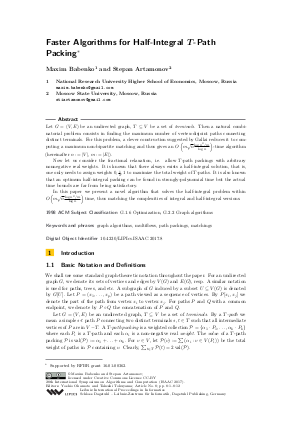Faster Algorithms for Half-Integral T-Path Packing
Authors Maxim Babenko, Stepan Artamonov
-
Part of:
Volume:
28th International Symposium on Algorithms and Computation (ISAAC 2017)
Part of: Series: Leibniz International Proceedings in Informatics (LIPIcs)
Part of: Conference: International Symposium on Algorithms and Computation (ISAAC) - License:
 Creative Commons Attribution 3.0 Unported license
Creative Commons Attribution 3.0 Unported license
- Publication Date: 2017-12-07
File

PDF
LIPIcs.ISAAC.2017.8.pdf
- Filesize: 0.56 MB
- 12 pages
Document Identifiers
Subject Classification
Keywords
- graph algorithms
- multiflows
- path packings
- matchings
Metrics
- Access Statistics
-
Total Accesses (updated on a weekly basis)
0PDF Downloads0Metadata Views
Abstract
Let G = (V, E) be an undirected graph, a subset of vertices T be a set of terminals. Then a natural combinatorial problem consists in finding the maximum number of vertex-disjoint paths connecting distinct terminals. For this problem, a clever construction suggested by Gallai reduces it to computing a maximum non-bipartite matching and thus gives an O(mn^1/2 log(n^2/m)/log(n))-time algorithm (hereinafter n := |V|, m := |E|). Now let us consider the fractional relaxation, i.e. allow T-path packings with arbitrary nonnegative real weights. It is known that there always exists a half-integral solution, that is, one only needs to assign weights 0, 1/2, 1 to maximize the total weight of T-paths. It is also known that an optimum half-integral packing can be found in strongly-polynomial time but the actual time bounds are far from being satisfactory. In this paper we present a novel algorithm that solves the half-integral problem within O(mn^1/2 log(n^2/m)/log(n)) time, thus matching the complexities of integral and half-integral versions.
Cite As Get BibTex
Maxim Babenko and Stepan Artamonov. Faster Algorithms for Half-Integral T-Path Packing. In 28th International Symposium on Algorithms and Computation (ISAAC 2017). Leibniz International Proceedings in Informatics (LIPIcs), Volume 92, pp. 8:1-8:12, Schloss Dagstuhl – Leibniz-Zentrum für Informatik (2017)
https://doi.org/10.4230/LIPIcs.ISAAC.2017.8
BibTex
@InProceedings{babenko_et_al:LIPIcs.ISAAC.2017.8,
author = {Babenko, Maxim and Artamonov, Stepan},
title = {{Faster Algorithms for Half-Integral T-Path Packing}},
booktitle = {28th International Symposium on Algorithms and Computation (ISAAC 2017)},
pages = {8:1--8:12},
series = {Leibniz International Proceedings in Informatics (LIPIcs)},
ISBN = {978-3-95977-054-5},
ISSN = {1868-8969},
year = {2017},
volume = {92},
editor = {Okamoto, Yoshio and Tokuyama, Takeshi},
publisher = {Schloss Dagstuhl -- Leibniz-Zentrum f{\"u}r Informatik},
address = {Dagstuhl, Germany},
URL = {https://drops.dagstuhl.de/entities/document/10.4230/LIPIcs.ISAAC.2017.8},
URN = {urn:nbn:de:0030-drops-82750},
doi = {10.4230/LIPIcs.ISAAC.2017.8},
annote = {Keywords: graph algorithms, multiflows, path packings, matchings}
}
Author Details
References
- M. A. Babenko. A fast algorithm for the path 2-packing problem. Theory of Computing Systems, 46(1):59, 2008. URL: http://dx.doi.org/10.1007/s00224-008-9141-y,
-
M. A. Babenko, A. Gusakov, and I. P. Razenshteyn. Triangle-free 2-matchings revisited. Discrete Math., Alg. and Appl., 2:643-654, 2010.

- M. A. Babenko and A. V. Karzanov. Min-cost multiflows in node-capacitated undirected networks. Journal of Combinatorial Optimization, 24(3):202-228, 2012. URL: http://dx.doi.org/10.1007/s10878-011-9377-3,
-
T. Feder and R. Motwani. Clique partitions, graph compression and speeding-up algorithms. J. Comput. Syst. Sci., 51:261-272, October 1995.

-
A. V. Goldberg and A. V. Karzanov. Maximum skew-symmetric flows and matchings. Mathematical Programming, 100(3):537-568, 2004.

-
L. Lovász and M. D. Plummer. Matching Theory. Akadémiai Kiadó - North Holland, Budapest, 1986.

-
W. Mader. Über die maximalzahl kantendisjunkter H-wege. Archiv der Mathematik (Basel), 31:382-402, 1978.

- G. Pap. Some new results on node-capacitated packing of A-paths. In Proceedings of the Thirty-ninth Annual ACM Symposium on Theory of Computing, STOC '07, pages 599-604, New York, NY, USA, 2007. ACM. URL: http://doi.acm.org/10.1145/1250790.1250878, URL: http://dx.doi.org/10.1145/1250790.1250878.
-
G. Pap. Strongly polynomial time solvability of integral and half-integral node-capacitated multiflow problems. EGRES Technical Report, TR-2008-12, 2008.

-
A. Schrijver. Combinatorial Optimization. Springer, Berlin, 2003.

